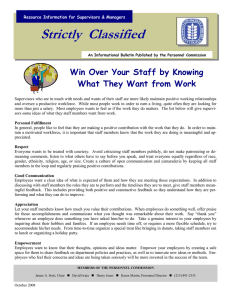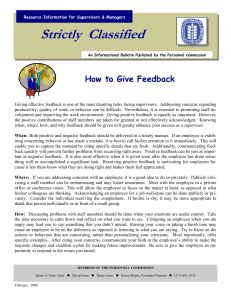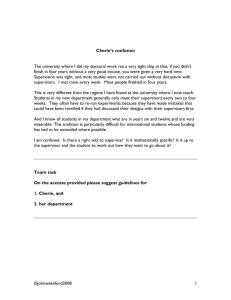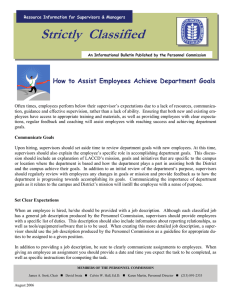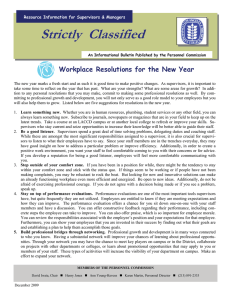Strictly Classified Improving Department Productivity
advertisement
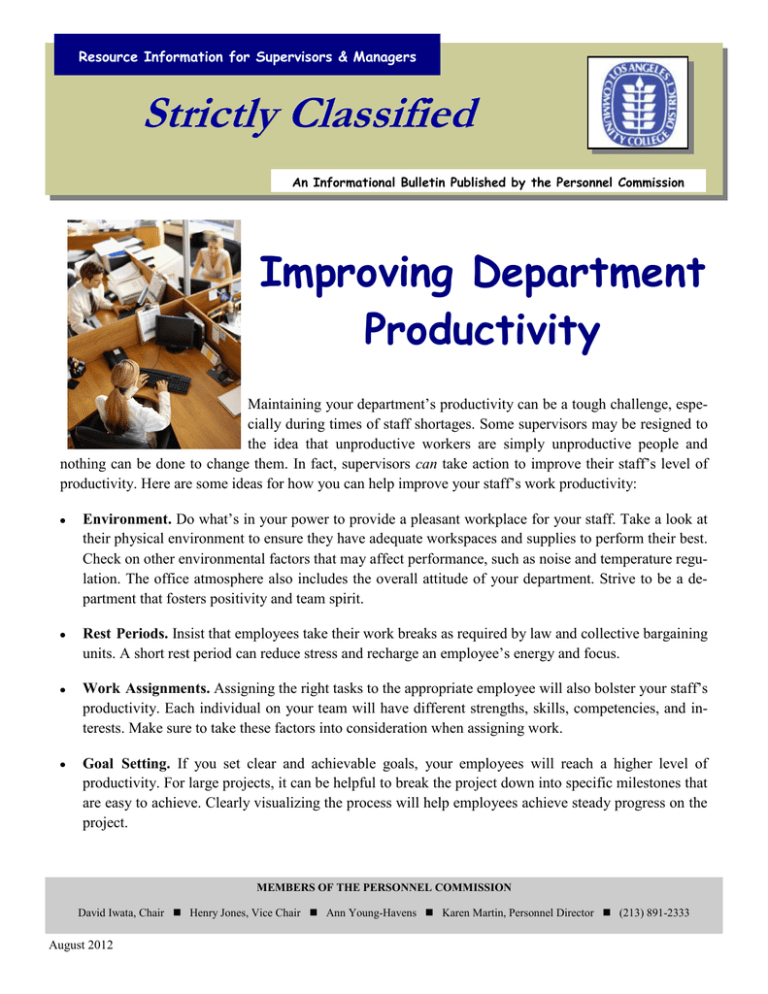
Resource Information for Supervisors & Managers Strictly Classified An Informational Bulletin Published by the Personnel Commission Improving Department Productivity Maintaining your department’s productivity can be a tough challenge, especially during times of staff shortages. Some supervisors may be resigned to the idea that unproductive workers are simply unproductive people and nothing can be done to change them. In fact, supervisors can take action to improve their staff’s level of productivity. Here are some ideas for how you can help improve your staff’s work productivity: Environment. Do what’s in your power to provide a pleasant workplace for your staff. Take a look at their physical environment to ensure they have adequate workspaces and supplies to perform their best. Check on other environmental factors that may affect performance, such as noise and temperature regulation. The office atmosphere also includes the overall attitude of your department. Strive to be a department that fosters positivity and team spirit. Rest Periods. Insist that employees take their work breaks as required by law and collective bargaining units. A short rest period can reduce stress and recharge an employee’s energy and focus. Work Assignments. Assigning the right tasks to the appropriate employee will also bolster your staff’s productivity. Each individual on your team will have different strengths, skills, competencies, and interests. Make sure to take these factors into consideration when assigning work. Goal Setting. If you set clear and achievable goals, your employees will reach a higher level of productivity. For large projects, it can be helpful to break the project down into specific milestones that are easy to achieve. Clearly visualizing the process will help employees achieve steady progress on the project. MEMBERS OF THE PERSONNEL COMMISSION David Iwata, Chair Henry Jones, Vice Chair Ann Young-Havens Karen Martin, Personnel Director (213) 891-2333 August 2012 Recognition. Many supervisors are not used to giving employee recognition because they haven't receive enough themselves. However, this is a facet of leadership that should not be ignored. The cost is nothing while the reward is huge. Don’t hold back from commending your employees verbally, whether it’s public praise or private feedback, planned ahead of time or spontaneous. When recognizing productive employees, remember to include staff members who have improved their productivity even if they are not one of your top performers. This will encourage their upward swing in productivity to continue. Training. Many supervisors think of training as something designated for new employees and maybe the occasional sizable change in a system or process. In reality, training should never end. Employees can gain from refresher training sessions and ongoing professional development that will enhance their skills and performance. Empowerment. Identify employees who have demonstrated their merit, and grant them some autonomy over their work. Provide clear objectives and guidelines, but allow them some latitude regarding the details of setting and achieving their goals. Empowering employees gives them ownership over their work, a greater investment in the results, and increased pride over their accomplishments. Take a proactive approach to supporting your staff’s success. Remember to introduce programs aimed at raising productivity in a non-threatening and rewarding way. Employee morale has a huge effect on productivity, so it is important to treat your staff with respect and tact. Unhappy employees will not care about their work, and an employee who doesn’t care will be unproductive. Avoid the mistaken belief that a demanding taskmaster will get more work out of employees than a helpful and accommodating supervisor. Your goal is to have employees operating at an optimal level, not their maximum level which will only result in burnout and negativity. Remember, the key to effective leadership is positive influence, not control.
